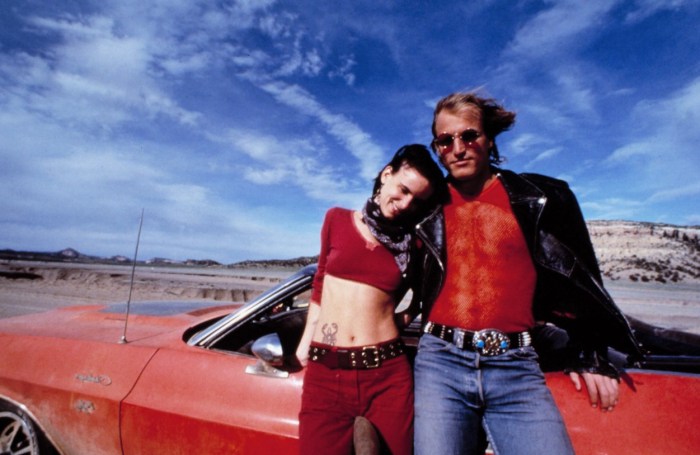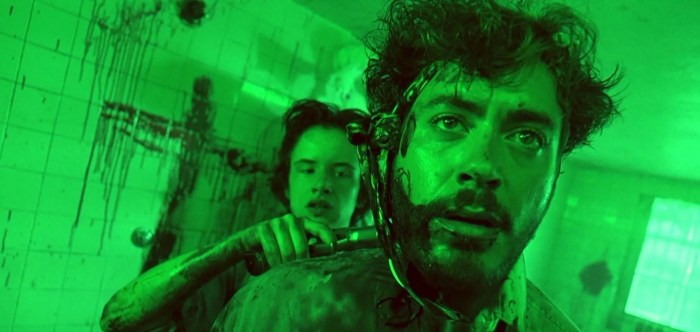Natural Born Killers, a term steeped in controversy and intrigue, invites us on an exploration of the origins, complexities, and societal implications of this enigmatic concept. This discourse delves into the psychological, biological, ethical, and legal facets that surround the notion of individuals innately predisposed to violence.
From the historical roots of the term to its modern-day interpretations, we unravel the diverse meanings and perceptions associated with “natural born killers.” We examine the psychological traits and biological factors that may contribute to violent behavior, while also considering the ethical dilemmas and legal implications of labeling individuals as such.
Psychological and Biological Factors

The concept of “natural born killers” has been a subject of fascination and debate for decades. While there is no single definition or profile that fits all individuals who commit violent crimes, research has identified certain psychological traits and biological influences that may contribute to violent behavior.
Psychological Traits
- Antisocial Personality Disorder:Individuals with this disorder exhibit a lack of empathy, remorse, and disregard for social norms. They may also display impulsivity, aggression, and a history of criminal behavior.
- Psychopathy:Psychopaths are characterized by a lack of empathy, remorse, and a superficial charm. They may also have a high level of intelligence and be manipulative.
- Childhood Trauma:Exposure to severe abuse or neglect during childhood can lead to the development of psychological problems, including aggression, hostility, and a lack of trust.
Biological Influences
In addition to psychological factors, biological influences may also play a role in violent behavior. These include:
- Genetics:Studies have shown that certain genetic variations may be associated with an increased risk of aggression and violence.
- Neurobiology:Differences in brain structure and function, particularly in the prefrontal cortex and amygdala, have been linked to aggressive behavior.
- Hormones:Elevated levels of certain hormones, such as testosterone, may contribute to aggression and violence, particularly in males.
It is important to note that not all individuals with these psychological traits or biological influences will become violent offenders. However, the presence of these factors may increase the risk of violent behavior, particularly when combined with other environmental and social factors.
Ethical and Legal Implications: Natural Born Killer
The concept of “natural born killers” raises significant ethical and legal dilemmas. These individuals are often portrayed as inherently evil, with no capacity for empathy or remorse. However, such a simplistic view overlooks the complex interplay of psychological and biological factors that may contribute to violent behavior.
Labeling individuals as “natural born killers” has profound legal implications. It can lead to harsher punishments, diminished opportunities for rehabilitation, and even the denial of basic rights. This raises concerns about the potential for wrongful convictions and the erosion of due process.
Ethical Considerations
One of the primary ethical concerns surrounding the concept of “natural born killers” is the question of responsibility. If these individuals are truly born with an inherent propensity for violence, to what extent can they be held morally and legally accountable for their actions? This dilemma challenges our traditional notions of free will and the role of personal choice.
Another ethical concern is the potential for stigmatization and discrimination. Labeling someone as a “natural born killer” can have a devastating impact on their life. It can lead to social isolation, employment discrimination, and even violence. This raises important questions about the ethical obligations we have to individuals who may be at risk for violent behavior.
Legal Considerations
The legal implications of labeling individuals as “natural born killers” are also complex. In the United States, for example, the death penalty is reserved for the most heinous crimes. However, the use of this punishment has been challenged in recent years, in part due to concerns about the potential for wrongful convictions.
The infamous film ‘Natural Born Killers’ left an indelible mark on cinema, exploring the depths of human nature and the seductive power of violence. In the annals of art and science, Leonardo da Vinci stands as a towering figure, embodying the spirit of the Renaissance.
His birthdate, as recorded in When Was Leonardo Da Vinci Born , marks a pivotal moment in history. As we delve into the psyche of Natural Born Killers, we find echoes of the timeless themes that Leonardo da Vinci’s art and inventions continue to illuminate.
The concept of “natural born killers” could further complicate this debate, as it raises questions about the extent to which individuals should be held fully responsible for their actions.
Another legal concern is the potential for diminished opportunities for rehabilitation. If individuals are viewed as inherently incapable of change, it may be difficult to justify investing in programs that aim to address the underlying causes of their violent behavior.
This raises important questions about the role of the criminal justice system in addressing the problem of violent crime.
Media Portrayals and Cultural Impact

The concept of “natural born killers” has been a subject of fascination and controversy in popular culture, with portrayals in film, television, and literature shaping public perception and attitudes towards violence.
These portrayals often depict individuals with inherent psychological and biological predispositions towards violence, reinforcing the notion of a distinct class of individuals who are inherently violent and uncontrollable.
The intense thriller “Natural Born Killer” delves into the psyche of violent criminals, exploring the dark impulses that drive them. While the film’s exploration of such extreme behavior is thought-provoking, it also raises questions about the broader implications of social media in shaping our understanding of such phenomena.
What Does Hru Mean On Snapchat , for instance, is a common query that highlights the pervasive use of abbreviations and acronyms in online communication. As we delve deeper into the digital realm, it becomes increasingly important to understand the nuances of such language and its potential impact on our perception of the world around us, including the nature of violent crime and the motivations behind it.
Ultimately, “Natural Born Killer” serves as a timely reminder of the complex interplay between media, society, and the human psyche.
Film and Television
- Films like Natural Born Killers(1994) and American Psycho(2000) portray individuals with a seemingly insatiable thirst for violence, driven by psychological disturbances and traumatic childhood experiences.
- Television shows like Dexter(2006-2013) and Mindhunter(2017-present) explore the complexities of individuals with violent impulses, highlighting the interplay between biological and psychological factors.
Literature, Natural Born Killer
- Novels like Bret Easton Ellis’s American Psycho(1991) and Anthony Burgess’s A Clockwork Orange(1962) delve into the psychological motivations and societal influences that shape violent behavior.
- These literary works often explore the ethical and moral implications of labeling individuals as “natural born killers,” challenging simplistic notions of good and evil.
Intervention and Prevention

Preventing and mitigating violent behavior is a complex issue that requires a multifaceted approach. Effective interventions must address both the psychological and biological factors that contribute to aggression, while also considering the ethical and legal implications of various strategies.
Mental health professionals play a crucial role in identifying and treating individuals who may be at risk for engaging in violent behavior. Early intervention, such as cognitive-behavioral therapy and medication management, can help reduce symptoms of mental illness and promote adaptive coping mechanisms.
Role of Law Enforcement
Law enforcement agencies have a responsibility to enforce laws against violence and protect the public from harm. However, they must also be trained to recognize the signs of mental illness and respond appropriately. Crisis intervention teams, which consist of trained mental health professionals and law enforcement officers, can provide a safe and effective way to de-escalate situations and connect individuals with the necessary treatment.
Role of Society
Society as a whole has a role to play in preventing violence. This includes promoting healthy relationships, reducing poverty and inequality, and providing access to education and employment opportunities. Media literacy is also important, as exposure to violent content can desensitize individuals to violence and increase the risk of aggressive behavior.
Comparative Perspectives
The concept of “natural born killers” varies across cultures and societies, shaped by cultural factors that influence the definition and understanding of violent behavior.
Cultural Factors
- Socialization and Norms:Cultural norms and socialization practices can influence the development of violent tendencies, with some cultures emphasizing violence as a legitimate means of conflict resolution.
- Belief Systems and Values:Religious and philosophical beliefs can shape attitudes towards violence, with some cultures valuing honor, vengeance, or self-defense as justifications for violent acts.
- Historical Context:Historical experiences, such as war, genocide, or political oppression, can contribute to a culture’s perception of violence as a necessary evil or a legitimate means of achieving goals.
Final Review
In conclusion, the concept of “natural born killers” remains a multifaceted and challenging topic that warrants further research and discussion. By understanding the origins, complexities, and societal implications of this concept, we can work towards developing effective interventions and strategies for preventing and mitigating violent behavior.
Questions Often Asked
What are the key psychological traits associated with “natural born killers”?
Studies have identified certain psychological traits that may be more common among individuals who engage in violent behavior, such as aggression, impulsivity, lack of empathy, and a history of childhood trauma.
Can biological factors contribute to violent behavior?
Research suggests that certain biological factors, such as genetic predispositions, brain abnormalities, and exposure to toxins, may increase the risk of violent behavior. However, it is important to note that these factors alone do not determine whether an individual will become violent.
What are the ethical implications of labeling individuals as “natural born killers”?
Labeling individuals as “natural born killers” raises ethical concerns about stigmatization, discrimination, and the potential for self-fulfilling prophecies. It is crucial to approach such labels with caution and consider the complex interplay of psychological, biological, and social factors that contribute to violent behavior.